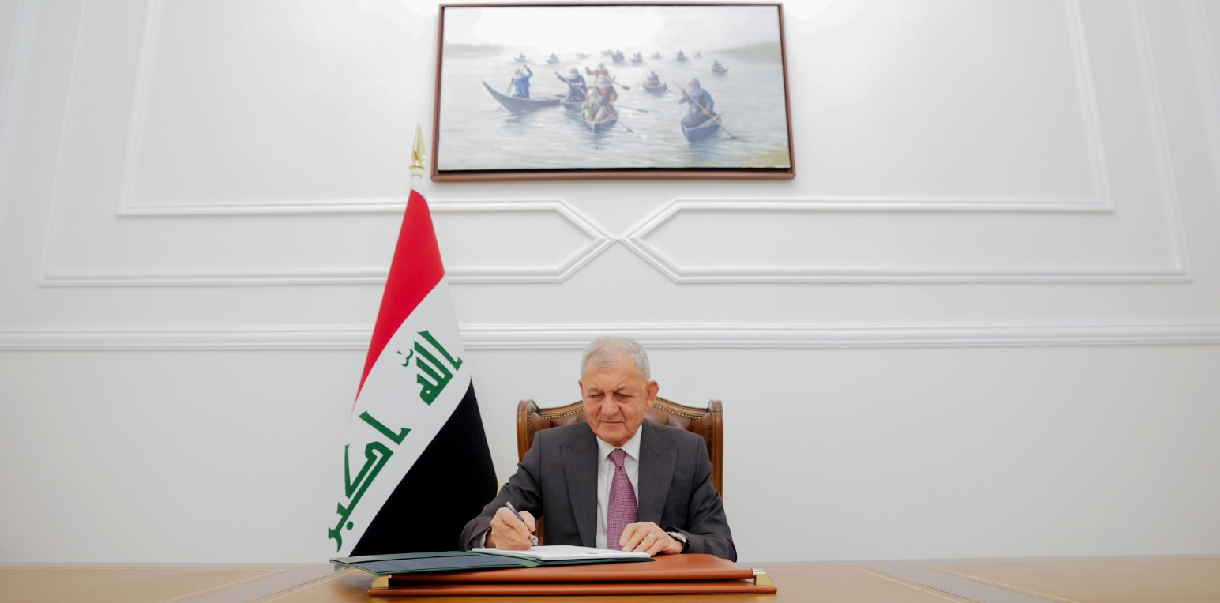Iraqi president signs controversial holiday law

Shafaq News/ Iraq's President Abdullatif Rashid on Tuesday signed a law that has sparked controversy in the multi-sectarian country over the inclusion of "Eid al-Ghadeer" as an official holiday.
On Sunday, the Iraqi parliament forwarded a law outlining official holidays to President Rashid for approval.
The legislation, which sparked debate due to the inclusion of "Eid al-Ghadeer" as a national holiday, establishes 11 annual holidays in addition to the existing Friday and Saturday weekend breaks.
Eid al-Ghadeer is a major religious holiday celebrated by Shiite Muslims on the 18th of Dhu al-Hijjah in the Islamic calendar. According to the Shiite belief system, the occasion commemorates the Prophet Muhammad's (PBUH) final sermon at Ghadir Khumm, where he is believed to have appointed his cousin, Ali ibn Abi Talib, as his successor and the first Imam. This event holds supreme importance for Shiite Muslims and is a cornerstone of their faith. The leader of the Sadrist Movement, Muqtada al-Sadr, encouraged the Iraqi Parliament last month to formally declare Eid al-Ghadeer a national holiday.
Parliament voted on the proposed law last Wednesday, with the inclusion of Eid al-Ghadeer as a national holiday proving to be a contentious issue.
Many Sunnis view the holiday as a negation of the rule of the first three caliphs. Sunni politician and former Parliament Speaker Osama al-Nujaifi lambasted the move on social media as "unpatriotic" suggesting it might "harm the national fabric".
In an apparent effort to appease Sunni Muslims, who make up around 40 percent of Iraq's population, the parliament also designated 12 Rabia' al-Awwal as the Prophet Mohammed's birthday, aligning with the Sunni celebration. However, the Shia observance of the Prophet's birthday on 17 Rabia al-Awwal was not included in the official holidays calendar.
A document sent from the speaker's office to the president's office cites Article 73, Clause Three of the Iraqi Constitution, stating, "In accordance with this provision, we are forwarding the Law on Official Holidays, voted upon on May 22, 2024, during session 26 of the first legislative term within the third legislative year, fifth electoral term."
The cabinet, per the law, retains the authority to suspend Saturday, but not Friday, holidays under specific circumstances.
In most Muslim-majority countries, Friday holds a special place unlike any other day of the week. It's not just the end of the workweek, but also a day steeped in religious significance. For Muslims, Friday is considered the holiest day. Jumu'ah prayers, congregational prayers held at mosques, are mandatory for all practicing male Muslims who are able. These prayers occur at a designated time on Friday, often followed by religious sermons and teachings. This emphasis on communal worship and religious learning elevates Friday's importance within the Islamic faith.
Traditionally, many Muslim-majority countries have structured their weekends around Friday. This weekend structure aligns perfectly with the importance of Friday prayers, allowing Muslims time to attend these mandatory prayers and participate in other religious activities.





